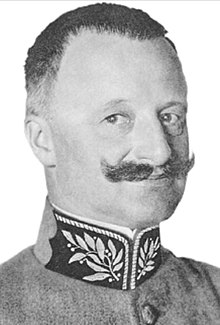Emil Sonderegger
Emil Sonderegger (born November 28, 1868 in Herisau , † July 14, 1934 in Bern ) was a Swiss officer and chief of staff who later positioned himself politically on the extreme right.
biography
Sonderegger's father owned an embroidery company , for which the son worked in the export sector and made numerous business trips abroad. At a young age, Emil Sonderegger became a co-owner of this embroidery, but then decided to pursue a career as a professional in the Swiss Army . In 1906 he was appointed Chief of Staff of the VII Division (renamed the 6th Division from 1911) and the 3rd Army Corps. As Chief of Staff of the 3rd Army Corps, he was jointly responsible for the imperial maneuvers on the occasion of Kaiser Wilhelm II's visit to Eastern Switzerland in 1912 . He commanded the 3rd Mountain Brigade and, from 1918, the 4th Division as a Colonel Division. During the general strike in November 1918 , he commanded the troops of order in the city of Zurich , and his martial and sometimes relentless demeanor earned him high recognition in bourgeois circles. Since 1920 Chief of Staff , he resigned from this post in 1923 due to political differences over the planned restructuring of the Swiss Army.
Sonderegger then worked for the Swiss Industrial Association and for an arms manufacturer. In the course of time he turned increasingly to politics, where he became a pronounced opponent of parliamentary democracy . As a military writer, he appeared as a lecturer at frontist events in the 1930s and wrote a. a. the text Ordinance in the State (1933), in which he called for a constitutional revision in an authoritarian, anti-liberal and anti-Semitic sense. In 1933, Hans Oehler , at that time publisher and editor-in-chief of the Swiss monthly magazine , succeeded in persuading Sonderegger to join the National Front . Using his military experience, he played a crucial role in transforming the National Front from a round table into a street political movement. The sluggishness of the National Front quickly led to disillusionment, and so Sonderegger left the group that same year to found the Volksbund with Ernst Leonhardt . In February 1934, however, Sonderegger and Leonhardt also separated, with Sonderegger forming his own Popular Front . When he died in the same year, his group was absorbed into the Federal Front .
literature
- Thomas Fuchs: Sonderegger, Emil. In: New German Biography (NDB). Volume 24, Duncker & Humblot, Berlin 2010, ISBN 978-3-428-11205-0 , p. 571 f. ( Digitized version ).
- Thomas Fuchs: Sonderegger, Emil. In: Historical Lexicon of Switzerland .
- Philip Rees: Biographical Dictionary of the Extreme Right Since 1890. Harvester, New York 1990, ISBN 0-7108-1019-9 .
- René Zeller : Emil Sonderegger. From chief of staff to leader of the front. Verlag Neue Zürcher Zeitung, Zurich 1999, ISBN 3-85823-792-2 .
Web links
- Literature by and about Emil Sonderegger in the catalog of the German National Library
- Emil Sonderegger in the archive database of the Swiss Federal Archives
Individual evidence
- ↑ Eugen Bircher : Colonel Major Emil Sonderegger in memory ( Memento from January 26, 2018 in the Internet Archive ) In: Allgemeine Schweizerische Militärzeitung . Issue 7, 1934 (archived in the E-Periodica of the ETH Zurich ).
- ^ Lieutenant Colonel Meyer: Report on the maneuvers of 1912. In: Allgemeine Schweizerische Militär-Zeitung . 1912, p. 301 ff.
- ^ Colonel Feyler: Les manœuvres du IIIème corps d'armée en 1912. In: Revue militaire suisse. 1912, pp. 809-827 and 909-912.
- ^ Emil Sonderegger ( Memento from December 8, 2015 in the Internet Archive ). Ueli Sonderegger's private website.
- ^ Willi Gautschi : The state strike 1918. Benziger, Zurich 1968.
| personal data | |
|---|---|
| SURNAME | Sonderegger, Emil |
| BRIEF DESCRIPTION | Swiss military, member of a right-wing extremist organization |
| DATE OF BIRTH | November 28, 1868 |
| PLACE OF BIRTH | Herisau |
| DATE OF DEATH | July 14, 1934 |
| Place of death | Bern |

